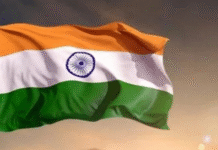
The Chittagong arms haul case shows how deeply we have become part of the Indo-Pak conflict. The case occurred during the BNP era and the people involved include the then home minister, several intelligence officials and other minions. It’s a bit ironic that the very people who had intercepted the consignment have now been found guilty of it. But if memory serves right, it was tipped off from the highest Indian security level and there was no excuse not to intercept the haul. The prosecution says that it’s the then BNP government who were facilitating the shipment though one is still not sure what Nizami was doing in this. It has all the hallmarks of an international intrigue gone wrong. In fact, the local parties are just pawns and it’s international players who are playing their proxy war here and Bangladesh is now caught smack in the middle.
* * *
The Indo-Pak (Hindu-Muslim) conflict to put in more honest terms began during the British era. The fight has always been over who has the right to rule over India. If the upper class North Indians felt that only they had a right to rule India no matter who didn’t agree with this monolithic vision of India often driven by caste principles, the Muslim upper class construction of nationalism was the same. The upper class Shareef Muslims largely of North India felt that they were the true rulers of India displaced by the Brits and the ruling right should be restored to them. Thus, two antagonistic forces fighting over the right to rule over others with their consent or not, created two nationalisms, both grounded in ethno-religious identities that have never stopped fighting with each other. It has resulted in the bloodbaths of 1947, the largest migration ever of nearly 14 million people, at least three major wars, nuclearization of South Asia and endless number of proxy wars that have plagued the region. The smaller countries sometimes try to take advantage of this rivalry to gain some benefits but history shows that it’s the smaller ones that come out hurt and that include Bangladesh.
* * *
How deep this connection is can be understood from 1971. Bangladesh was helped by India because it was in conflict with Pakistan. India-Pakistan fought each other as early as 1947 over Kashmir and no matter what the merit of the case, what matters is that instead of resolving the issue they have built more wars on it. Pakistan was a totally Kashmir focused country which ignored East Pakistan because we never were really part of the same objectives that ran (West) Pakistan, a continuation of the British era Hindu-Muslim conflict. In 1971, they fought each other and Bangladesh benefited from this.
India sheltered the refugees, armed the soldiers, hosted the government-in-exile and undertook international diplomacy and finally went to war against Pakistan. Bangladesh issue was there but the dominant one for India was its long term aim to halve Pakistan which to be honest was already done courtesy Pakistan’s denial of rights of the Bengali Pakistanis. So engrossed was Pakistan about its enemy across the border, it forgot about East Pakistan. Without this Indo-Pak hostility there would possibly be no Bangladesh as we know it. Imagine what would have happened to us if India and Pakistan were friends!
* * *
It was only therefore natural that the first Bangladesh government was very pro-Indian and dependent on it to beef its security status including creation of the Rakkhi Bahini which became a contest of the traditional Bangladesh army. As post 1971 governance declined, India became the enemy by association also. The political changes of 1975 generated such anti-Indian feelings that Zia felt he could get away with reintroducing the treasonous Jamaat-e-Islami back into politics. Around this time both the Arab and the Pakistan block all opposed to India gave support to Zia. Ultimately, international politics played a huge role in deciding the inner political dynamics of Bangladesh although from which it has never got any discernible advantage.
* * *
In the internal war within Bangladesh, the AL is India’s historical ally and the BNP is therefore Pakistan’s inevitable friend. Both have had many stories about these parties being closely advised by respective intelligence agencies and funds transfer is no secret or object of shame either. As a result, Bangladesh is like a playground of the two antagonists, a game over which they have no control. Can Bangladesh survive such a dangerous stratagem?
* * *
India has internal terrorism problems and in the troubled North-East, active insurgencies are on. Pakistan and some say China have been supporting these groups for years and it doesn’t seem to be getting better. Pakistan supports these groups so that India is weakened and has used Nepal and Bangladesh for this purpose. During the BNP era this always increases and several NE leaders have used Bangladesh as their operational HQs. To this has been added the Islamic extremists and allegations that BD is a sanctuary for many such groups is no secret either. So BNP supports this strategy hoping to leverage India though there is no evidence that Bangladesh has gained much taking such moves. Perhaps the ideological section of the BNP is more keen about this with the desire to hurt the enemy’s friend. Whatever be the intent, the fact remains that we are part of the South Asian terrorist equation and it’s increasingly becoming a major factor in constructing our national politics as well.
* * *
The AL on the other hand has gone all out in acting on India’s behalf to ensure that security threats to India due to Bangladesh action are minimised and Bangladesh is safe for India. The unstinted support for the AL by the Indians particularly during the last elections has been great news for them though India failed to deliver anything whether on Teesta or border issues so the benefit calculation is no better with either parties. However, the collateral problem of this policy is that there have been rise of the feeling that Indian influence in Bangladesh is too high for comfort. It’s never good for a national government to be seen as totally loyal to a powerful next door neighbour when there are enemies within.
* * *
The result is that Bangladesh is now getting caught in the security and terrorism equation of India and Pakistan. As they fight the Indo-Pak proxy war without any sense of gain for Bangladesh, the main crisis is that India’s ability to solve its own terrorism crisis is limited and Pakistan is fanning its own flames. Neither seems to be in charge of their internal insurgencies and are quite happy to use Bangladesh as a battlefield, arms route or sanctuary. History doesn’t say that they have the capacity to win their own battles but in the process Bangladesh is getting caught in a trap into which we have willfully stepped into due to internal reasons. The interest extremist Islamic groups are showing in Bangladesh is very disturbing and one does hope we stay out of their shadow. But international politics is not predictable and its best if we could keep a safe distance from all contending parties, Islamic or atheist.
* * *
Unfortunately, it’s neither India nor Pakistan which is pushing us. We are doing it ourselves by sustaining an absurd political rivalry within that lets everyone use Bangladesh for their own gain.
Source: Bd news24









